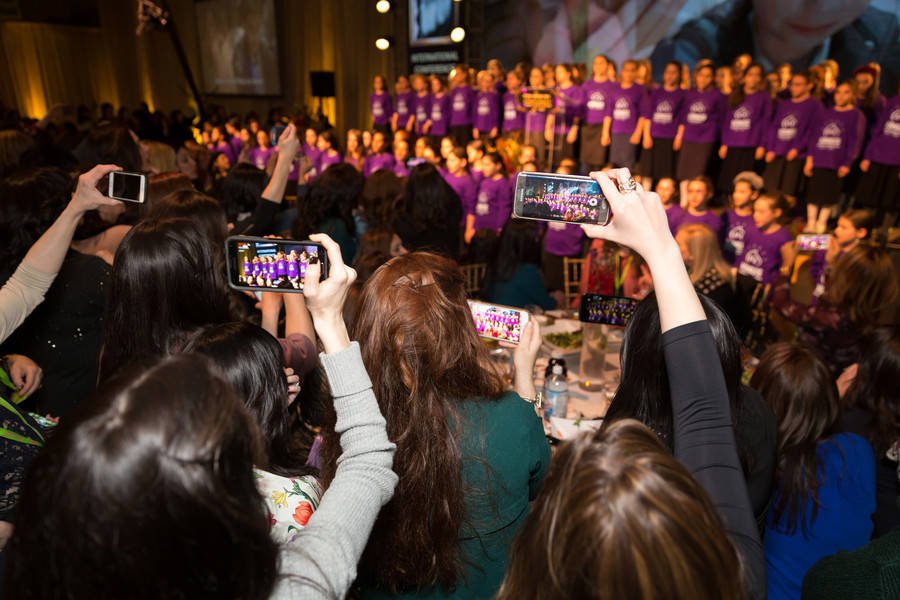Chabad women emissaries from 91 countries recharge at Brooklyn gala
It felt like a family reunion. Thousands of women were hugging, waving to friends and snapping pictures in the newly renovated Pier 12 Brooklyn Cruise Terminal at Sunday night’s gala banquet of Kinus Hashluchos (the International Conference of Chabad-Lubavitch Women Emissaries).
The annual event wrapped up four days of learning, socializing, praying and recharging in Brooklyn for emissaries, lay leaders and guests.
“Standing here, taking in this awe-inspiring crowd, the thought that comes to mind is that the entire world is represented right here,” said MC Chani Shemtov, co-director of Chabad at the University of Illinois for the past nine years with her husband, Rabbi Bentzion Shemtov.
Each time a speaker talked about their victories and struggles, heads around the room nodded in agreement.
Growth and outreach were emphasized by Rabbi Moshe Kotlarsky, vice chairman of Merkos L’Inyonei Chinuch, Chabad’s educational arm. While he praised the shluchos for their tremendous work, he noted that “there are so many more people to reach. You can’t leave out even one person.”
He urged the women to “go back with strength and purpose,” encouraging them to take their newfound energy to “reach each and every Jew.”
Rabbi Kotlarsky recognized not only the spiritual work of the emissaries in an evening dedicated to “Permeating the World With Sanctity,” but the nitty-gritty as well. On one hand, he said, “shlichus is about spreading holiness and making the world a dwelling place for G‑d. But at the same time, it comes down to the mundane —the cooking and the cleaning and the preparing and making programs, worrying about the bank, worrying about challah-baking, raising children … everything that goes into your lives.”
Yehuda Krinsky, chairman of Merkos L’Inyonei Chinuch, noted that the entire event honors the 29th yahrtzeit of Rebbetzin Chaya Mushka Schneerson, wife of the Rebbe, Rabbi Menachem M. Schneerson, zt”l.
Guest speaker Esther Wilhelm, who became an emissary in 1994 to Zhitomir, Ukraine, with her husband, Rabbi Shlomo Wilhelm, acknowledged the many challenges that went along with the job.
“How,” she posed rhetorically, “can a young couple in their early 20s, who grew up in Chassidishe communities where they had everything available, come to a place where they don’t know the language and they’re unfamiliar with the local mentality, how can they hope to create real change in such a place?”
And she answered: “Only by knowing that we were coming not with our own talents and capabilities, but with the strength and the inspiration of the Rebbe.”
The Jews of Zhitomir, she quickly discovered, “had grown up with the notion that being Jewish was something to be ashamed of, was an embarrassment, something to hide. That’s when we realized that our first step in restoring Yiddishkeit in this part of the world would be to restore a feeling of Jewish pride, to know that being Jewish is not an embarrassment; rather, it is something in which we can rejoice in, something in which to take pride.”

 60.0°,
Mostly Cloudy
60.0°,
Mostly Cloudy 




